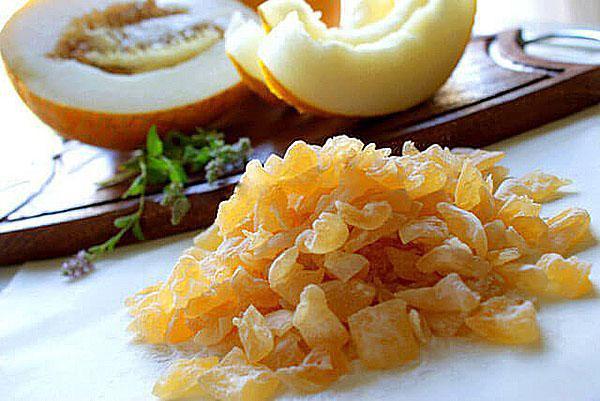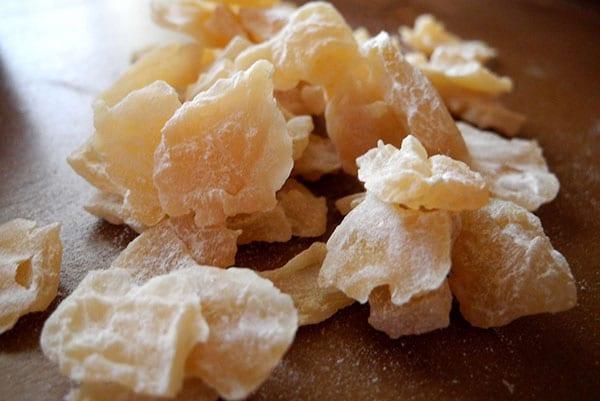Candied ripe melon - delicious summer greetings
 There is no need to talk about the positive qualities of candied fruits: they are often added to their diet even by those who adhere to proper nutrition and control their weight. Candied melon fruits, along with other sweets of this kind, are attractive not only for their amazing taste, but also for their benefits.
There is no need to talk about the positive qualities of candied fruits: they are often added to their diet even by those who adhere to proper nutrition and control their weight. Candied melon fruits, along with other sweets of this kind, are attractive not only for their amazing taste, but also for their benefits.
In this article, we will talk about what beneficial properties are preserved in candied fruits, how to prepare the melon for processing, and also consider several ways to prepare this delicacy.
Briefly about the main

Despite the fact that there are a huge number of specialized and ordinary stores that offer ready-made candied fruits, their purchase still raises doubts. Most of the ready-made candied fruits are heavily processed, the bright aroma is not natural, but a common culinary flavor; taste also leaves much to be desired - sweet slices are simply "rubber".
If you make candied fruits from melons at home, you can be sure of both the quality of the initial product and their harmlessness (see. jam from watermelon peels with lemon for the winter).
Candied fruits from the dense part of the melon
 While candied fruit retains fewer health benefits, the benefits are clear. In addition to the fact that they are able to completely replace the usual sweets, candied melon fruits are also recommended to be used to increase immunity during epidemics of infectious diseases, as well as for those who suffer from cardiovascular diseases. Of course, everything needs a measure: two or three candied fruits a day will be enough.
While candied fruit retains fewer health benefits, the benefits are clear. In addition to the fact that they are able to completely replace the usual sweets, candied melon fruits are also recommended to be used to increase immunity during epidemics of infectious diseases, as well as for those who suffer from cardiovascular diseases. Of course, everything needs a measure: two or three candied fruits a day will be enough.
Melon preparation
Many culinary experts who offer recipes for candied melon say: any fruit, even overripe, will do. This is not true! Melon must be fresh, unless, of course, you want to get a strange gruel instead of melon sweets.
 The processing process itself is simple: the melon is peeled from seeds, separated from the peel and - most importantly! - from the softest part of the pulp (the one closer to the core). For candied fruits, take the densest fragments of the fruit. The slices themselves are cut in such a way as to make one bite.
The processing process itself is simple: the melon is peeled from seeds, separated from the peel and - most importantly! - from the softest part of the pulp (the one closer to the core). For candied fruits, take the densest fragments of the fruit. The slices themselves are cut in such a way as to make one bite.
Syrup preparation
 Candied Melon Sugar Syrup is usually prepared in a large, heavy saucepan. The amount of sugar and water is taken in a ratio of 3: 1 - this applies only to those recipes where candied fruits are prepared from pulp.
Candied Melon Sugar Syrup is usually prepared in a large, heavy saucepan. The amount of sugar and water is taken in a ratio of 3: 1 - this applies only to those recipes where candied fruits are prepared from pulp.
The mixture of water and sugar is brought to a boil and the melon slices are carefully added to the syrup so that it completely covers them.
Then there are two cooking options:
- In the first case, the melon is boiled over low heat for about an hour, stirring constantly. With this option, you need to carefully monitor the slices - they should become transparent, but not fall apart.

- The second method will take a little more time, but it is safer. The slices are boiled for five minutes over medium or high heat, then removed from the stove and cooled. The process is repeated several times until the melon has completely absorbed the syrup. In this case, you will be able to fully control the process.
If the sugar syrup is too liquid, then the candied fruits will deteriorate very quickly, and if you overdo it with sugar, the fruit will lose its elasticity and density.
Final stage
 The easiest way to dry candied melon fruits for the winter is to use the oven. The baking sheet must be covered with paper (otherwise it will be impossible to tear off the sugared pieces), the melon slices are taken out of the pan using a slotted spoon and laid out on paper so that they do not stick to each other. The ideal temperature for drying is 100 degrees, but the time varies depending on your oven.
The easiest way to dry candied melon fruits for the winter is to use the oven. The baking sheet must be covered with paper (otherwise it will be impossible to tear off the sugared pieces), the melon slices are taken out of the pan using a slotted spoon and laid out on paper so that they do not stick to each other. The ideal temperature for drying is 100 degrees, but the time varies depending on your oven.
The candied fruits are removed from the paper immediately after you take them out of the oven.
 Fresh candied melon fruits have one property - they stick strongly to any surface. Therefore, you need to contrive and quickly transfer them to the dish. Do not use a spatula - the melon will stick to it easily - it is best to use a wide knife.
Fresh candied melon fruits have one property - they stick strongly to any surface. Therefore, you need to contrive and quickly transfer them to the dish. Do not use a spatula - the melon will stick to it easily - it is best to use a wide knife.  If the last melon slices still cannot be removed, then send them back to the oven for a few minutes, and then remove.
If the last melon slices still cannot be removed, then send them back to the oven for a few minutes, and then remove.
Candied Melon Peels
 How to cook candied fruit melon, we figured it out. But there is another recipe in which not the pulp of the fruit is used, but its crust.
How to cook candied fruit melon, we figured it out. But there is another recipe in which not the pulp of the fruit is used, but its crust.
 The recipe does not differ too much from the original one, the technology remains the same: cooking in syrup is drying, but some nuances still exist. To make candied melon rinds, you need:
The recipe does not differ too much from the original one, the technology remains the same: cooking in syrup is drying, but some nuances still exist. To make candied melon rinds, you need:
- before cooking, be sure to blanch the crusts in water with lemon juice or 0.5 teaspoon of baking soda for a few minutes;
- sugar syrup is prepared in a ratio of not 1: 3, but 1: 1, but the crusts are boiled two or three times with a break of 8-10 hours (!);
- the oven is heated to a minimum - 40-50 degrees will be enough.
 Eating candied fruits, regardless of whether you used pulp or peels, is worth a few days after cooking.
Eating candied fruits, regardless of whether you used pulp or peels, is worth a few days after cooking.